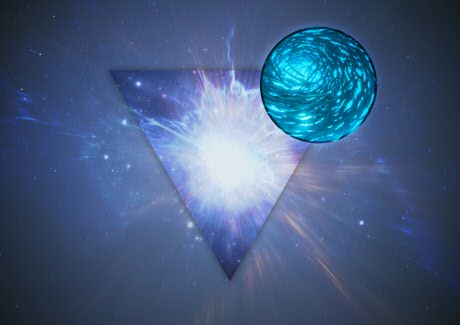Fundamentals of the Universe
Fundamentals of the Universe
The aim of this research theme is to study the fundamental forces of Nature with implications for the Universe. This theme connects research across all length scales by using the striking similarities in physics from the Planck scale (quantum gravity) via sub-atomic scales (particle physics) to cosmic dimensions (cosmology and astrophysics). Pivotal to our approach is the use and development of advanced instrumentation and mathematics, because they are the essential tools we have to probe and describe Nature.
Our institutes join forces to play a leading role in this exciting topic as a united research activity and to educate a new generation of students to perform research in this new interdisciplinary field.
Building Blocks of the Universe
Our insights into the building blocks of matter and the structure of the Universe has advanced tremendously over the past years. This leads to the fascinating question whether the structure and evolution of the Universe can be understood in terms of the physics of elementary particles.
Historically, astronomy and astrophysics aims at describing physics at cosmic dimensions whereas elementary particle physics focuses on subatomic distance scales. The combination of these two separate fields leads to a whole new set of scientific challenges.
What are the implications of the discovery of the Higgs particle for cosmology? Do we understand the mechanisms that determine the mass of normal matter? What is the nature of dark matter and dark energy? What is the origin of the large scale structure of the Universe. Did the primordial Universe undergo a period of accelerated expansion? What do black holes and neutron stars teach us about the fundamental laws of physics? Is mathematics the language to describe fundamental theories of space, matter and time? To answer these questions requires a combined effort from astronomy, astro-particle physics, cosmology, mathematics and molecular, atomic, nuclear and particle physics.

The Emergent Universe
The concept of emergence connects all possible distance scales, from the Planck scale via sub-atomic scales to cosmic dimensions. At every scale large numbers of the separate building blocks (quarks, molecules, cells, galax- ies) display a fascinating collective behaviour.
Even though the building blocks are very different, the dynamics of the emergent behaviour shows a remarkable universality that is governed by general organising principles such as symmetry-breaking, self-organisation, phase-transitions and critical behaviour. The connections between the different levels of organisation in astronomy, chemistry, mathematics and physics has its mirror in biology where the different scales run from DNA molecules to populations. Similar phenomena occur in applications of new materials, big data and cognition. Emergence leads to mathematical questions such as what are the structures and principles that underly emergence. It even leads to the question whether the spacetime we live in itself is emergent. Many of the research activities will require an investment in top of the line computer facilities.

The Instrumentation Universe
Precision measurements and advanced instrumentation are at the basis of our knowledge of space, time and the building blocks of matter. Sensors are the eyes and ears of science by which theories can be rejected or replaced by new ones.
To perform top experimental research it is a prerequisite to have at one’s disposal a range of groundbreaking instruments. These tools are becoming more and more complex, often requiring high sensitivity, with immunity to background noise, and advanced data filtering, data flow and network connections. We recognise that such tools are best developed and used in a joint approach. To fulfil these requirements we bundle our facilities to share experience and tools, work on joint projects and train and educate young researchers. Valorisation is an important part of this universe.

